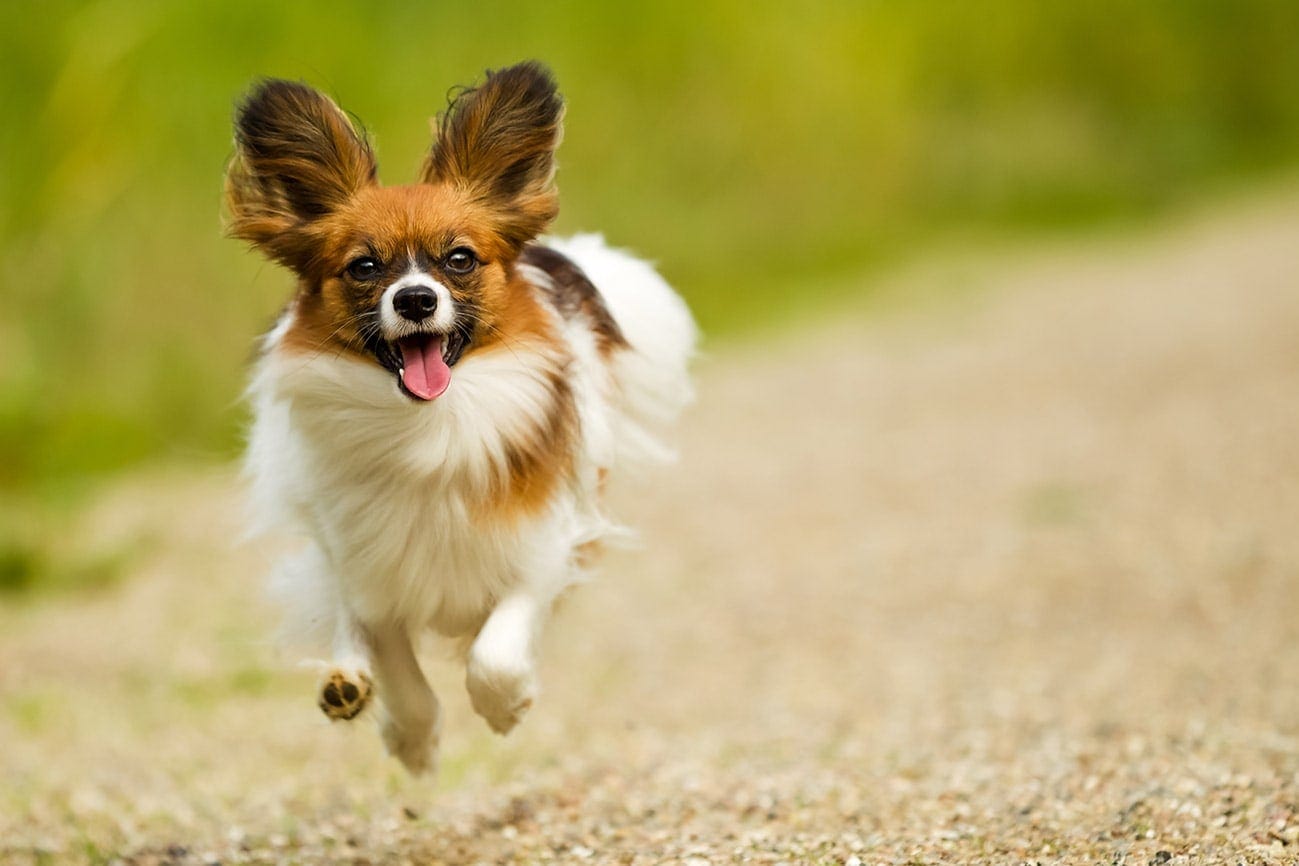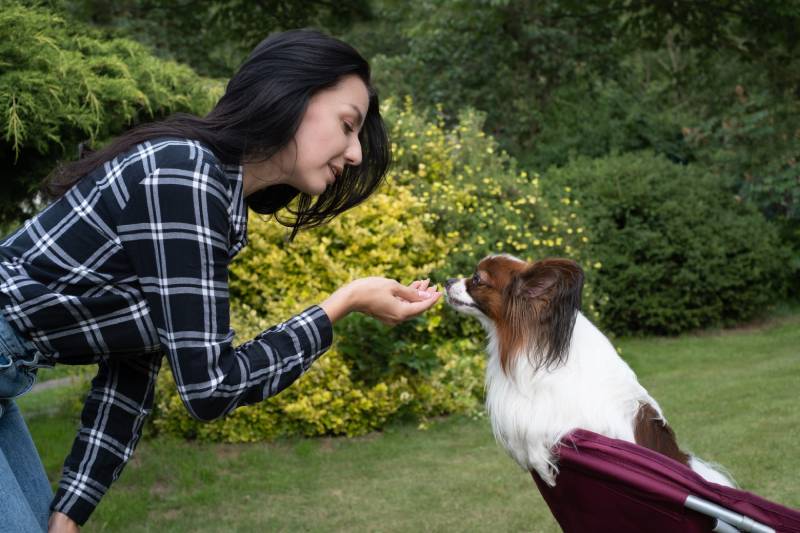Do Papillons Bark a Lot? Breed Temperament & Training Tips

Updated on

Click to Skip Ahead
If you’re considering bringing a Papillon into your home and family, you might be wondering if they are heavy barkers. In short, Papillons have a moderate tendency to bark. They don’t bark as often as some breeds, but they’re certainly not silent, either.
To learn more about their barking behavior, we need to get to know Papillons a bit better. So join us as we take a closer look inside the life and attributes of this unique breed.
Why Do Papillons Bark So Much?
The answer to this depends on the dog. In general, Papillons are known for their alertness and will often bark to alert their owners to something unusual. However, they aren’t prone to “yappy” behavior and are generally quite manageable when it comes to barking. That doesn’t mean your Papillon won’t bark more or less.
Every dog is an individual, and some Papillons might bark more than others. The key to managing your Papillon’s barking lies in understanding their needs and providing an appropriate outlet for their energy and alertness.
In the following sections, we will delve into the Papillon’s personality traits, energy levels, and exercise needs, as well as how these aspects might influence their barking behavior. We’ll also explore some effective ways to manage excessive barking if it becomes a problem.

Understanding the Papillon Breed
The Papillon, French for “butterfly”, is a small, dainty-looking breed named for the distinctive, butterfly-like appearance of its ears. Papillons are a type of Toy Spaniel and can trace their lineage back to the royal courts of Europe, where they were favored as lap dogs for their charm and companionship.
With their compact size, lively personality, and striking appearance, Papillons make excellent companions for both individuals and families.
Papillon Temperament
Despite their small stature, Papillons are renowned for their outgoing, happy demeanor. They’re known to be lively and energetic without being high-strung or nervous, which makes them fantastic pets for a variety of households.
They enjoy socializing with both humans and other animals, including cats and larger dogs, although caution should be taken to ensure larger pets don’t accidentally harm them due to their small size.
These adorable little dogs are intelligent and have an intense desire to please, traits that make them not only easy to train but also a favorite in obedience and agility competitions. They are even recognized for their talents in tracking and as therapy dogs.
Yet, their energy levels are manageable and don’t demand an excessive amount of exercise. While they certainly enjoy a good play session or a romp around the yard, they’re also quite content to curl up in a lap for some quality relaxation.

Papillon Size and Appearance
Both male and female Papillons typically stand between eight and twelve inches at the shoulder and weigh between three and ten pounds. They have a long, silky coat that’s generally white with patches of other colors like black, red, lemon, tan, or sable.
Their coat, unlike other longhaired breeds, doesn’t have an undercoat or bi-annual shed, and the long hairs don’t mat easily. This makes their grooming needs quite manageable.
Their most distinguishing feature, of course, is their large, upright ears that flare out from their head. As mentioned, a moment ago, these ears are reminiscent of a butterfly’s wings. Hence, the Papillon name (the French word for “butterfly”).
The Papillon’s Energy Level and Exercise Needs
Papillons are naturally energetic, but their exercise needs aren’t as high as some might think. A quick twenty-minute walk or play session each day is usually enough to keep them happy and healthy.
That said, their intelligent nature means they also enjoy mentally stimulating activities. Puzzle toys, agility training, or even a fun game of hide-and-seek can be great ways to engage their minds as well as their bodies.
Although they’re small, Papillons aren’t delicate or fragile. They’re robust enough to enjoy playtime with larger dogs, provided it’s supervised to ensure their safety.

Do Papillons Bark Excessively?
Returning to our initial question, Papillons are not typically excessive barkers. They’re alert and might bark to notify their owners of changes in their environment, but they’re not prone to the persistent, nervous yapping that can be common in some small breeds.
However, a bored, under-stimulated, or anxious Papillon might develop a barking habit. They’re social creatures and require adequate attention and mental stimulation.
If they’re left alone for extended periods or don’t receive enough exercise or mental engagement, they may resort to barking to express their frustration or anxiety. Fortunately, there are solutions for that.
How Do I Get My Papillon to Stop Barking?
Has your Papillon developed a tendency to bark excessively? It’s not uncommon, and thankfully, there are several strategies you can use to manage this behavior.

Regular Exercise and Mental Stimulation
As energetic and intelligent dogs, Papillons require both physical exercise and mental stimulation to stay happy and well-behaved. Regular walks, play sessions, and mentally engaging activities such as puzzle toys or training can help keep your Papillon satisfied and less likely to resort to excessive barking.
Training
Training can also play a crucial role in managing a Papillon’s barking. A well-trained Papillon should respond to commands such as “quiet” or “enough,” which can be used to interrupt and eventually reduce unnecessary barking. Remember, consistency is key when it comes to training.

Socialization
Papillons are naturally sociable dogs that enjoy being around others. Regular interaction with other dogs or people can help to keep them content and reduce anxiety-induced barking. This is especially effective if started at an early age. The sooner you socialize your Papillon, the less likely it will be to bark at the sight of people or animals.
Keeping Your Papillon Healthy and Safe
Beyond managing their barking, there are several things you can do to ensure your Papillon leads a healthy, safe life. Here are some basic guidelines to follow when raising a Papillon. These tips can apply to many other breeds, too. It’s important to converse with your vet for a more tailored approach based on your pet’s age, health, and needs.

Regular Vet Checkups
Regular vet checkups are vital to detect any potential health issues early. Papillons have an average lifespan of 14 to 16 years, and with proper care, they can remain energetic and youthful well into their old age.
Balanced Diet
A balanced diet is essential for a Papillon’s health. As small dogs, they require less food than larger breeds, but their diet should still be rich in quality protein, healthy fats, and carbohydrates. Talk to your vet about the best food options for your Papillon.

Grooming
Although Papillons have a long, silky coat, they lack an undercoat and don’t shed excessively. Regular brushing will keep their coat looking its best and prevent any matting. A bath every few months or so, or whenever they get particularly dirty, should be sufficient.
Safety Measures
Due to their small size, Papillons can be at risk around larger animals. Ensure they’re always supervised when interacting with larger dogs and teach children to handle them gently to avoid any accidental injuries.
Final Thoughts
While Papillons do bark, it’s not typically to an excessive degree. They’re alert and lively dogs, and they may use barking to communicate, but they’re not inclined to be yappy—and for many pet parents, that’s what matters most when it comes to noise levels.
Each Papillon is an individual, and some may bark more than others, but with appropriate exercise, mental stimulation, and training, any excessive barking can usually be managed effectively.
The Papillon is a wonderful breed that makes for an excellent companion, offering a delightful blend of energy, intelligence, and sociability. With the right care and attention, a Papillon can be a wonderful addition to your home, bringing joy and companionship for many years to come.
Featured Image Credit: Ainsley Stapleton, Shutterstock










